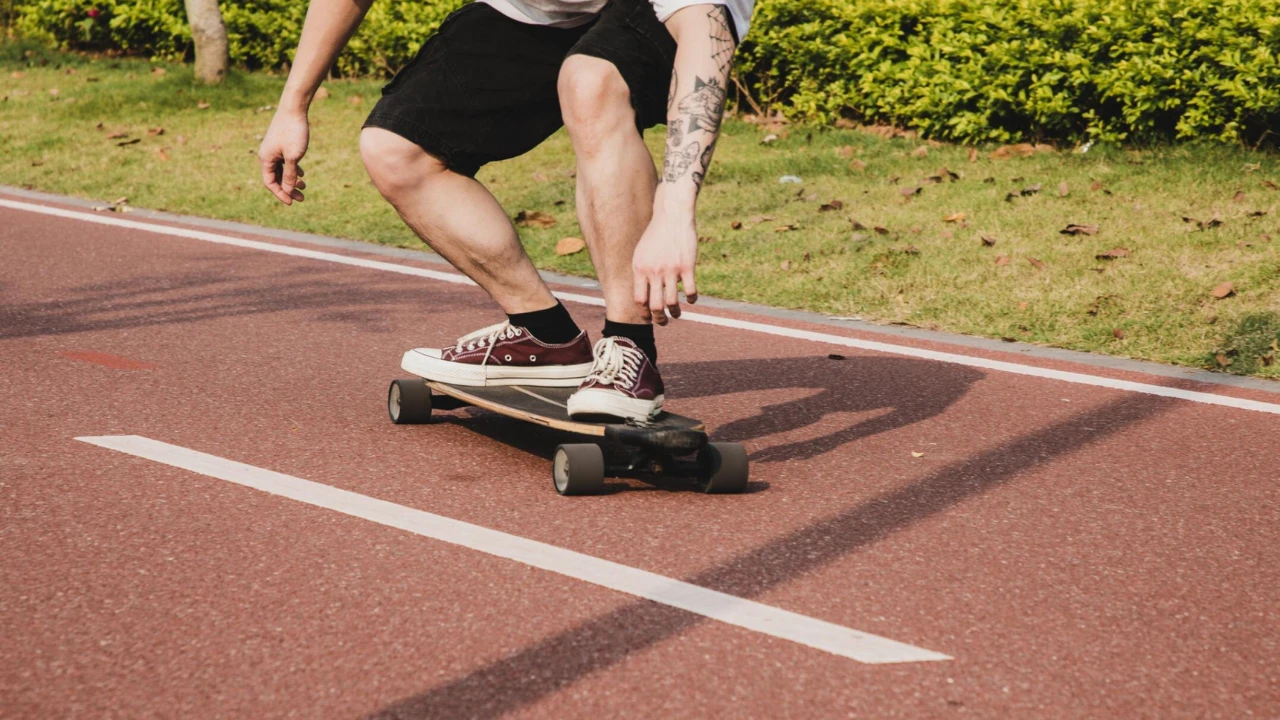11 Exciting Advantages of Skateboarding for All Ages

In recent decades, skateboarding has evolved from a pastime for surfers seeking thrills on land into a global phenomenon. Since its founding in the 1950s, skateboarding has thrived, carving a niche in the hearts of millions of people worldwide. In today’s world, it’s more than just a sport. It’s a lifestyle, a form of artistic expression, and a means of transportation for many.
Skateboarding offers numerous physical and mental benefits. It improves balance, coordination, and flexibility while providing an outlet for creativity and self-expression. Additionally, it promotes a sense of community and camaraderie among skateboarders, fostering friendships and a shared passion for the sport.
Key Takeaways
- Skateboarding boosts physical health and mental well-being, enhancing cardiovascular fitness, and balance, and reducing stress.
- It fosters community and inclusivity, connecting diverse individuals through shared passion.
- Skateboarding serves as an eco-friendly transportation option, promoting urban exploration and environmental consciousness.
Table of Contents
1. Skateboarding as a physical workout

Although skateboarding places significant demands on the body, the exhilaration and fun it offers to mask the effort made by skating. Skateboarding can be compared to a full-body workout, especially if you engage in it regularly. It is mainly targeted at cardiovascular health, as it requires constant movement that keeps the heart rate elevated for the duration of the workout. It is also a boon for muscle development, especially in the legs and core, which are crucial for performing tricks and maintaining balance. The balance and coordination that skateboarders develop are unmatched, with the benefits of Skateboarding spilling over into other areas of their lives.
2. Mental Health Benefits of Skateboarding

There are many mental health benefits associated with skateboarding, some of which are profound. The mental focus necessary to master a trick or navigate a complex route is a beautiful mental escape from the pressures of everyday life. A strong sense of accomplishment and self-esteem is fostered when goals are achieved, making it a powerful tool for building confidence and a feeling of accomplishment. Skateboarding can also help reduce stress and anxiety and provide an outlet for creativity and self-expression. It can also be a great form of exercise, as it is a great way to get physically active and burn calories while skating..
3. Social and Community Benefits

Inherently, skateboarding is a social activity. Whether it is skate parks or street skating spots, skate parks and street skating spots are melting pots of culture and friendship where individuals of varying backgrounds can join together, united by their shared passion for the sport. Due to its inclusivity, Skateboarding offers a sense of belonging to those who might feel excluded from other arenas of life. Skateboarding can also be a form of self-expression, allowing individuals to express themselves through their skating style, tricks, and clothing.
4. Development of Skills and Creativity
Falling is an essential part of skateboarding, just as flying is an integral part of skateboarding. Skateboarding is a journey that teaches perseverance, patience, and resilience, which are valuable life skills we can apply to our everyday lives. In addition, there are endless possibilities for creative expression as each skater brings their unique style and flair to their tricks, creating infinite possibilities for creative expression. Skateboarding is also a great way to stay active and healthy. It can provide a great workout and help to reduce stress and anxiety. Skateboarding can also bring people together and build a sense of community.
5. Advantages of Skateboarding for Transportation
As a green alternative to motor vehicles, skateboarding has emerged as one of the fastest-growing activities in urban settings. The airplane provides an unusual vantage point from which to explore cityscapes, allowing one to weave through the urban environment with ease and agility as if it were a normal plane. Skateboarding also will enable individuals to discover hidden parts of a city, providing a unique and immersive way to explore. This experience encourages a sense of exploration and adventure while also reducing traffic congestion and emissions.
6. Enhancing Spatial Awareness
Taking part in skateboarding improves one’s spatial awareness, and skaters are taught how to navigate and interact with their surroundings innovatively. The heightened awareness that skateboarding requires is crucial not only to skateboarding but to other sports and activities as well. Skateboarding also helps to develop problem-solving skills since skaters must think quickly to land tricks and navigate obstacles. It also requires creativity, as skaters must be able to find unique solutions to challenging situations. Finally, skateboarding teaches the importance of perseverance, as skaters must never give up on their goals.
7. Affordability and Accessibility
One of the sport’s most fantastic attractions is its low entry barrier. Unlike many other sports, skateboarding can be started with minimal investment because public spaces are often used as skating venues. Its accessibility has significantly contributed to its global popularity. As a result, skateboarding has become a form of self-expression and entertainment. It has also enabled skateboarding to become a popular hobby, with millions of people engaging in it worldwide.
8. Improving Reflexes and Reaction Time
Among the many benefits of skateboarding is that it sharpens reflexes and increases reaction time due to its dynamic nature, which involves unexpected challenges and obstacles. Skating teaches skaters how to make split-second decisions, which is handy in various other aspects of their lives. It also helps to improve balance and coordination and develop a sense of spatial awareness. Additionally, it can be a great source of exercise, helping to build muscle and burn calories.
9. Cross-training Benefits

Skating can be an excellent cross-training tool for athletes in other sports disciplines. A wide range of sports can benefit from enhancing core strength, balance, and agility achieved through this workout. Skating can also help to improve coordination and posture, as well as increase overall endurance. Additionally, it can help athletes to develop better body awareness and control. Skating can also help reduce stress, improve concentration, and boost energy levels. All of these benefits can help athletes to excel in their chosen sports.
10. Freedom and Independence
Skateboarding embodies the embodiment of freedom and independence. In other words, it creates a space where individuals can express themselves, explore their limits, and navigate the world on their terms. Skateboarding allows people to be free from society’s limitations and express themselves without fear of judgment. It is also a source of community and connection, as skateboarders often form tight-knit gangs and form deep friendships. Skateboarding also serves as a form of activism, as it allows individuals to make a statement about the world they live in. It also provides a platform for those with a voice to use it and to make a positive change in the world around them.
11. Contributing to Local Economies
By supporting small businesses, skateboarding contributes to the growth of the local economy and facilitates tourism in the area. Several skate parks attract visitors, as do competitions and skate shops, while the sport’s popularity benefits numerous related industries. In addition to supporting small businesses and facilitating tourism, skateboarding also creates job opportunities within the local community. Skate parks require maintenance and staff, competitions need event organizers and judges, and skate shops need employees. By fostering a skateboarding culture and providing these economic opportunities, local communities can experience positive growth and development.
Risk Management and Safety Awareness
Even though skateboarding involves risks, it has also been a valuable teaching tool regarding risk assessment and safety. Skaters develop a keen sense of awareness and precaution as they assess their abilities and understand the environment in which they operate. This awareness helps the skater identify potential risks and avoid them. It also allows the skater to develop problem-solving skills as they adapt to unexpected circumstances. Other aspects of life can also benefit from this.
Environmental Impact and Sustainability
Skateboarding’s ecological footprint is relatively low, especially compared to the carbon footprint of motorized sports. As a result, the skateboarding community is becoming increasingly aware of sustainability issues and is promoting eco-friendly practices and materials to achieve a sustainable future. Fostering sustainability in skateboarding helps reduce environmental impact and sets an example for other industries and communities.
By adopting eco-friendly practices and materials, the skateboarding community can inspire and influence positive change toward a more sustainable future, creating a ripple effect that extends beyond the skatepark and into society. This long-term commitment to sustainability can lead to a greener and more conscious world for future generations.
How to Get Started with Skateboarding

Starting skateboarding may seem intimidating initially, but anyone can embark on this rewarding journey with the right equipment and a willingness to fall and learn. A good skateboard of good quality, good safety gear, and patience are the keys to skating success. Beginners should take their time to learn the basics and practice in a safe area. Advanced skaters have a variety of tricks and stunts to learn. Ultimately, skateboarding can be an enjoyable and healthy activity for everyone.
Skateboarding and Education

A skateboarding session is not just about learning physical skills; it offers educational opportunities as well. Many programs and scholarships use skateboarding as a learning and personal development tool, underscoring that it is a sport with many facets. By teaching skateboarding, these programs can teach young people essential life skills such as problem-solving, communication, and teamwork. Additionally, skateboarding can enable young people to express themselves creatively and explore their urban environment.
Health Precautions and Injury Prevention
Although skateboarding is a lot of fun, taking precautions to prevent injuries is essential. Skaters can keep safe by wearing protective gear, learning proper techniques, and gradually progressing from simple tricks to more complex ones. They should also avoid skating on rough surfaces, be aware of their surroundings, and skate with experienced skaters. Finally, taking a break occasionally is crucial to rest and stretch.
The Role of Skateboarding in Community Development

Skateboarding has the potential to contribute to community development by giving youth a positive outlet, creating positive social connections, and contributing to the vibrancy of public spaces through their participation in skateboarding. Skateboarding can also bring economic benefits to local areas by building skate parks, skate shops, and other businesses related to the sport. Additionally, skateboarding can play a role in reducing crime, as it can help to minimize bored youth engaging in criminal activities.
Conclusion – Benefits of Skateboarding
Besides being a sport, skateboarding is more of a way of life that offers a unique blend of physical, mental, and social benefits of Skateboarding to those who participate in it. A wide range of advantages are associated with skateboarding, from its ability to improve health and foster creativity to its impact on society and culture.
Skateboarding offers myriad benefits, regardless of whether you’re a seasoned skater or someone considering stepping on a board for the first time. Skateboarding also encourages a sense of independence and self-confidence and provides an opportunity for self-expression. It can also help reduce stress and anxiety and offer a great way to bond with friends or family.
What are the health benefits of skateboarding?
Skateboarding is a comprehensive workout that enhances cardiovascular health, strength, balance, and coordination. Additionally, it is known to improve mental health by reducing stress and improving self-confidence and self-esteem.
How does skateboarding contribute to community and social life?
Skateboarding fosters community and belonging as skaters gather in parks and spots, share tricks and experiences, and form friendships. Its inclusive culture welcomes people from all walks of life and promotes unity and diversity.
Is skateboarding a good form of transportation?
Yes, skateboarding is a great way to travel around cities because it is sustainable, efficient, and eco-friendly. The technology enables you to navigate through urban landscapes with ease, avoid traffic jams, and reduce your carbon footprint.
Can skateboarding improve skills applicable to other sports?
Skateboarding enhances core stability, agility, and balance, all of which are benefits of cross-training. These skills are beneficial in surfing, snowboarding, and even martial arts, as well as in a variety of other sports.
What equipment do I need to start skateboarding?
Skateboarding requires various equipment, including a skateboard that suits your style (e.g., street or transition), protective gear such as helmets, knee pads, wrist guards, and comfortable, durable shoes designed for skating. Skateboarding also requires a skate park or suitable area to practice. Researching the area and ensuring it is safe for skating is essential.
How can I prevent injuries while skateboarding?
A skateboarder’s ability to prevent injuries depends on wearing protective gear, learning and practicing proper techniques, starting with the basics before progressing to more complex tricks, and skating in a safe, designated area to avoid hazardous conditions. Skateboarders should also warm up before skating and cool down afterward. They should also stay hydrated and get enough rest before engaging in physical activity.
